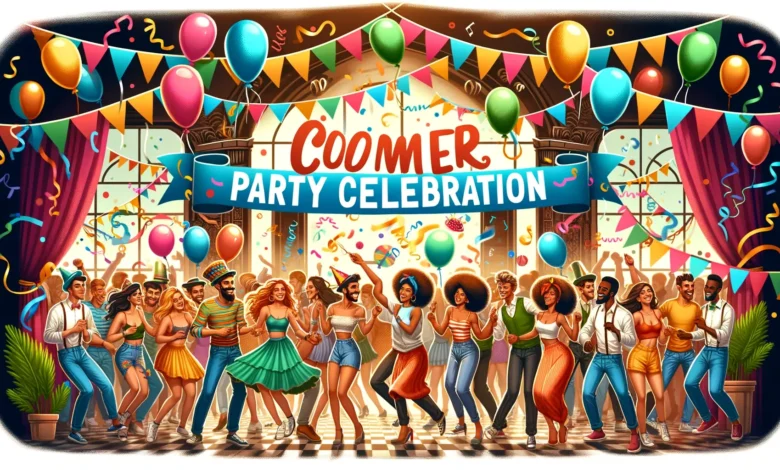Coomer Party: The Ultimate Guide to Understanding the Meme Culture

Introduction
The internet is a vast landscape of subcultures and memes, each more fascinating and perplexing than the last. One such phenomenon that has gained considerable attention in recent years is the “Coomer Party.” What began as a simple meme has evolved into a broader commentary on modern internet culture, specifically targeting issues related to compulsive behaviors and online addiction. Understanding the “Coomer Party” is crucial not only for those who frequent online forums but also for anyone interested in the dynamics of digital communities and their influence on real-world behaviors.
The term “Coomer” originated from a meme that portrayed a stereotypical internet user, often depicted as a lonely, isolated individual consumed by their online habits. This meme quickly spread across various platforms, including Reddit, 4chan, and Twitter, where it resonated with users who either saw themselves in the caricature or recognized the behaviors in others. The “Coomer Party” has since become a symbol of a larger movement, where online communities gather to discuss, and sometimes glorify, these compulsive behaviors. However, as with many internet trends, the “Coomer Party” has sparked significant controversy, raising questions about its impact on mental health and societal norms.
The Birth of the Coomer Meme
Origins of the Coomer Meme
The “Coomer” meme first appeared on internet forums around 2019, quickly gaining traction due to its relatable and exaggerated portrayal of a certain type of internet user. The meme typically features a cartoonish character with disheveled hair, dark circles under the eyes, and a generally unhealthy appearance—symbolizing someone who spends excessive time online, often engaging in compulsive behaviors like gaming, watching adult content, or endlessly scrolling through social media.
This character became an instant hit in online communities, especially on platforms like 4chan, where users frequently engage in self-deprecating humor. The “Coomer” meme was not just a joke; it was a reflection of a growing concern among internet users about the addictive nature of online activities. The meme served as both a warning and a badge of honor, depending on the audience, highlighting the thin line between harmless internet use and harmful addiction.
Coomer Party: From Meme to Movement
As the “Coomer” meme spread, it began to take on a life of its own. What started as a humorous depiction of internet addiction evolved into the “Coomer Party,” a term used to describe communities that embrace or discuss the behaviors associated with the “Coomer” archetype. These communities often gather on social media platforms and forums, where they share memes, stories, and experiences related to the “Coomer” lifestyle.
The “Coomer Party” is more than just a meme—it represents a subculture that has emerged from the internet’s darker corners. Participants in the “Coomer Party” often see themselves as part of a larger movement that critiques modern society’s reliance on digital consumption. However, the movement is not without its critics, who argue that it glorifies unhealthy behaviors and perpetuates negative stereotypes.
The Psychology Behind the Coomer Party
Understanding the Coomer Persona
The “Coomer” persona is a complex and multifaceted character that resonates with many internet users. At its core, the “Coomer” represents the everyman of the digital age—someone who is constantly plugged in, yet profoundly disconnected from the real world. This persona is often characterized by loneliness, social isolation, and an over-reliance on digital content for stimulation and comfort.
Psychologically, the “Coomer” can be seen as a manifestation of deeper issues related to addiction and mental health. The compulsive behaviors associated with the “Coomer” lifestyle—such as excessive consumption of adult content, video games, or social media—are often coping mechanisms for underlying feelings of inadequacy, anxiety, or depression. While the “Coomer” meme may be humorous on the surface, it reflects serious concerns about the impact of the internet on mental health.
Criticism and Controversy
The “Coomer Party” has faced significant criticism for its potential to glamorize or normalize harmful behaviors. Critics argue that by participating in the “Coomer Party,” individuals may reinforce negative habits and perpetuate unhealthy lifestyles. Moreover, the meme’s portrayal of the “Coomer” as a socially awkward and unattractive figure has been criticized for promoting harmful stereotypes and stigmatizing certain behaviors.
Mental health professionals have also weighed in on the controversy, warning that the “Coomer” meme could have damaging effects on individuals who identify with the persona. They argue that instead of encouraging individuals to seek help or make positive changes, the “Coomer Party” may trap them in a cycle of addiction and self-deprecation. This has led to a broader discussion about the ethical implications of internet memes and their impact on real-life behaviors.
The Cultural Impact of the Coomer Party
Coomer Party’s Influence on Internet Culture
Despite the controversy, the “Coomer Party” has had a significant impact on internet culture. It has spawned countless spin-offs and inspired a wave of memes and content that explore similar themes. The “Coomer Party” has also sparked discussions about masculinity, sexuality, and self-control, as the meme touches on issues that are often considered taboo or difficult to discuss openly.
In many ways, the “Coomer Party” has become a symbol of the internet’s ability to shape and reflect societal attitudes. It has brought to light the struggles that many people face in the digital age, from addiction to loneliness, and has forced us to confront the darker side of our online lives. However, its influence extends beyond just memes and internet culture—it has also made its way into mainstream media, where it is often referenced in discussions about online behavior and mental health.
The Coomer Party and NoFap Movement
The “Coomer Party” is often contrasted with the NoFap movement, which advocates for abstaining from certain behaviors that are associated with the “Coomer” lifestyle, such as excessive consumption of adult content. While the “Coomer Party” can be seen as embracing these behaviors, the NoFap movement seeks to resist them, promoting self-discipline and personal growth.
This contrast has led to a lively debate between the two groups, with each side arguing for the merits of their approach. The “Coomer Party” often criticizes the NoFap movement for being overly restrictive and judgmental, while NoFap advocates argue that the “Coomer Party” glorifies behaviors that are ultimately harmful. This debate reflects larger societal issues related to self-control, addiction, and the role of technology in our lives.
The Future of the Coomer Party
The Evolution of the Coomer Meme
As with many internet trends, the “Coomer Party” is likely to evolve over time. While it may fade in popularity, its influence on internet culture will likely persist. The “Coomer” meme has already inspired a range of derivative content, and it’s possible that new trends or subcultures will emerge from it in the coming years. The role of internet platforms in shaping the future of this trend cannot be underestimated, as they continue to provide a space for these communities to grow and evolve.
Long-Term Impact on Participants
The long-term impact of the “Coomer Party” on its participants is still uncertain. While some may eventually move on from the meme and its associated behaviors, others may find themselves deeply entrenched in the “Coomer” lifestyle. The potential psychological and social effects of this are significant, as the meme’s themes of loneliness, addiction, and internet overconsumption are likely to have lasting effects.
However, there is also potential for positive change within the “Coomer Party” communities. As awareness of the issues associated with the “Coomer” lifestyle grows, there may be opportunities for these communities to shift toward more constructive discussions and support networks. Whether the “Coomer Party” will remain a niche subculture or fade into obscurity will depend largely on how its participants choose to engage with it in the future.
Conclusion
The “Coomer Party” is a complex and multifaceted phenomenon that reflects both the humor and the darker side of internet culture. While it began as a simple meme, it has evolved into a broader commentary on modern society’s relationship with technology, addiction, and mental health. Understanding the “Coomer Party” is essential for anyone interested in the dynamics of digital communities and their influence on real-world behaviors. As this trend continues to evolve, it will be important to consider both its positive and negative aspects, and to engage in thoughtful discussions about the role of internet culture in our lives.





